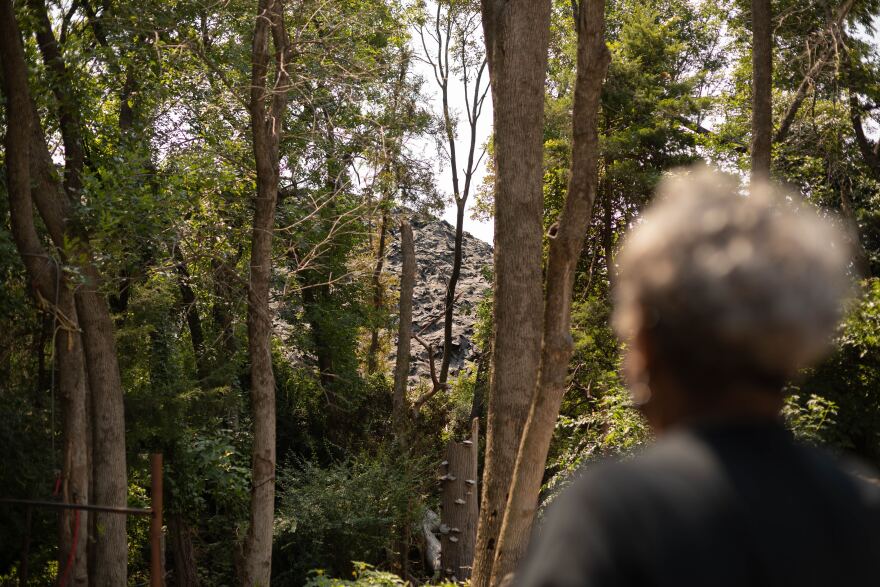Marsha Jackson has spent years advocating for the community of Floral Farms in southeast Dallas.
The environmental activist led the fight to remove a huge pile of waste known as Shingle Mountain from her neighborhood.
Now, , complete with a vibrant portrait of Jackson, memorializes that fight.
Glancing at the portrait painted by , the eye is immediately drawn to the bright red cowboy hat atop Marsha Jackson’s head. It’s a proud nod to her rodeo roots.
“A lot of people are still not familiar with Black cowboys or Black cowgirls, and that’s the reason why I ended up moving where I am now,” Jackson said.
Jackson moved to Floral Farms in the ‘90s so she could keep horses on her property. She’s one of the founders of the Dallas-Fort Worth Trail Riders Association.
In the portrait, she dons a soft, cream-colored shirt and gold hoops. Her look is contemplative. She’s surrounded by foliage, but the reality is that the residents of Floral Farms don’t have easy access to green spaces.

“We don’t even have sidewalks to run or go walking,” Jackson said. “My area looks nothing like when I first moved here … It bothers me that it seems like we’re just lost, a lost community. Hopefully, we can bring this greenery back.”
Developing more green spaces for Floral Farms is only the latest goalpost for Jackson and the neighborhood’s predominantly Black and Latino residents. Until recently, they were busy pushing the city of Dallas to remove the 100-thousand-ton toxic dump blighting their neighborhood.
Shingle Mountain was finally cleared last year. Brielle wanted to celebrate Jackson’s triumph. She was inspired to create work exploring environmental racism after hearing Jackson speak on a panel.
“She deserves so much visibility, and this issue does, because it opens the doors to learning about other ways in which Black and brown people are left out of the conversation about sustainability and green consciousness,” Brielle said.
The Dallas Museum of Art selected Brielle for their C3 Featured Artist Program, which spotlights North Texas artists.
Her installation is flanked on both sides by small monitors. On one screen: old news footage documenting the fight to remove the lead smelter in West Dallas in the ‘80s. On the other: Footage of Jackson and members of Southern Sector Rising, the group she formed to tackle racist zoning laws in Dallas.
“Black people and brown people have been at the brunt of industrialization for a long time,” Brielle said. “I wanted to understand how we got here via historical context.”
The work is part of a larger exhibition called "Rooted" exploring people and their relationship with the natural world.
Below Brielle's painting lies a small pile of the same roofing material Jackson fought to eradicate from Floral Farms. Brielle plans to slowly remove the shingles throughout the duration of the exhibit.
“And then you're just left with this image of Marsha,” Brielle said. “So, you're no longer focusing on the oppression or the injustice. It's more about this person.”
As much as her piece is about the successful removal of Shingle Mountain, Brielle also wants it to serve as a reminder that Jackson is still fighting for Floral Farms.
“She's still working on this issue because the area is still zoned for industrial use,” she said. “So, this could happen again at any time.”

Residents worked with the Dallas architecture firm HKS to design a community park with a garden and plenty of greenery. Whether or not it gets built is up to the city. Jackson says her community deserves better than what they’ve left behind.
“So now, over there where Shingle Mountain used to be, it's like a big hole, and it's filled with water in there,” Jackson said.
For Brielle, seeing Jackson’s continued efforts is equal parts inspiring and disheartening.
“Who would want their grandmother to be up all hours of the night working?” she said. “She should be able to rest and just enjoy her life and her grandchildren, her children, her home. But, she's fighting for it.”
It's clear looking at the portrait of Jackson's calm, determined eyes that she has no plans to give up that fight.
Both Jackson and Brielle will take part in �Ļ�ӰԺ's latest State of the Arts conversation called "Poisoned by Zipcode, Mended by Design" on March 5.
They'll be joined by Erin Peavey, an architect with HKS, and Evelyn Mayo of Downwinders at Risk. Join us for the panel Saturday, March 5th at the Dallas Museum of Art.
Got a tip? Email Miguel Perez at mperez@kera.org. You can follow him on Twitter .
�Ļ�ӰԺ is made possible through the generosity of our members. If you find this reporting valuable, consider today. Thank you.





